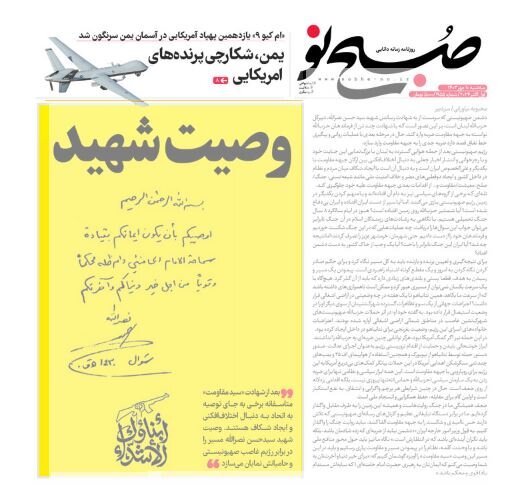Delusions of a devil

TEHRAN - In an analysis, Sobh-e-No wrote about the plan designed by the Zionist regime: "The new order" is a new code for Israel's crimes and is the continuation of the "greater Middle East" plan, which had already failed.
The only reason for its failure is the presence of resistance in the region. One of the main goals of this plan is to divide the countries of the Middle East into smaller and weaker ones to eliminate the possibility of resisting the influence of Israel and the United States. One of the other components of such plans is changing strategic and economic routes in the region. These efforts are seen as related to regional trade and energy projects and their goal is to isolate Iran economically and politically. However, these measures have not made a significant success. Due to its geopolitical position and historical role in global trade routes, Iran is a regional power and despite international sanctions and pressures, it has been able to maintain its economic and political relations with global powers such as China and Russia.
Hamshahri: Miscalculation about Iran's decisive response
In a note, Hamshahri addressed Iran's strategic policy after the martyrdom of Hassan Nasrallah and said: Following the assassination of Sayyed Hassan Nasrallah by the Zionist regime, the fear of Western-Hebrew axis from Iran's response and the resistance front is increasing. Internal unity in Iran centered on a "decisive response" also heralds the difficult days ahead of Tel Aviv. After these crimes, a new wave of propaganda about Iran's reaction to this terrorist act began. At the top of them, the anti-revolution media try to convey the idea that in the current situation, Iran is not prepared to respond to the assassination of Nasrallah and its hands are empty. The claim that Iran’s hand is empty to respond to the assassination of the Secretary General of Hezbollah is not even acceptable to the Zionist and Western authorities, because in his recent speech at the United Nations General Assembly, Netanyahu emphasized that his regime is at war in seven fronts. The confession shows Tel Aviv's plight and the strategic deadlock created for the regime by the resistance front with the centrality of Iran.
Jam-e-Jam: Consequences of Iran's stance for Israel
In an article, Jam-e-Jam discussed Iran's position against Israel. It quoted Alikhani, an international relations expert, as saying: For a long time, Netanyahu has been working hard to involve Iran and America in a direct clash. According to the Zionist regime, this conflict with Hezbollah may bring the Islamic Republic into the war. Iran's entry into the war does not mean Iran's war with the Zionist regime alone. America will also enter. From Netanyahu's point of view, this is a golden opportunity to create a direct conflict between Iran and the United States and, in general, Iran and the West. So far, Iran has adopted a smart approach and position and has not been caught in Netanyahu's trap. Even when Iran implemented the True Promise Operation, its form was in such a way that it minimized the negative consequences of Iran's response. The approach and positions of Pezeshkian in the UN General Assembly were to highlight several points related to this war. Pezeshkian questioned the attack on civilians and the clear violation of the international obligations by Israel. If Iran's diplomatic approach continues, it can help increase international pressure on the Zionist regime and Netanyahu.
Shargh: War of attrition, full-scale war
Shargh devoted its editorial to Israel's goals in the region, especially Iran, and said: The developments in the Middle East have entered a new and more challenging phase in the past two weeks. Three days after Hamas attacked Israel, Netanyahu spoke about "changing the map of the Middle East" and called the operation that led to the martyrdom of Seyyed Hassan Nasrallah, "Operation New Order". Israel wants to turn this plan into an opportunity to fight with resistance groups and confront Iran. Israel's apparent goal is to use the October 7 attack as an opportunity to put an end to the war of attrition managed by the resistance groups in its peripheral areas. This strategy can be followed with the support of Europe and America, the silence of China and Russia, and the indifference of Islamic and Arab countries. But Iran's policy of avoiding full-scale war has been correct. In case of a serious confrontation between Iran and Israel, America will not hesitate to enter the war, especially given the election atmosphere in the country. During the last few days, some people inside Iran have recommended developing nuclear weapons as a bulwark to avoid a full-scale war and a reaction to weaken the peripheral regional powers. But such advice is a catalyst for a huge threat to Iran's security.
